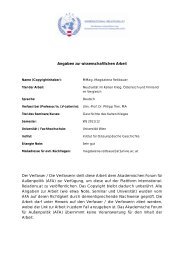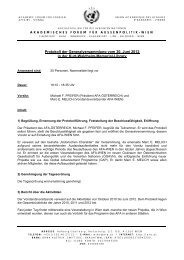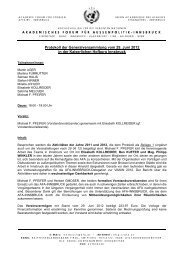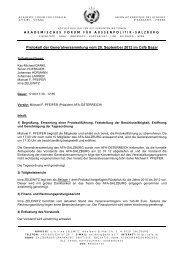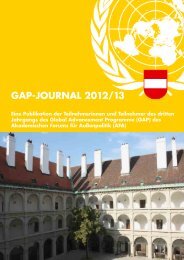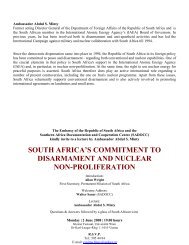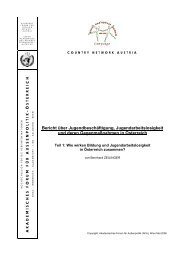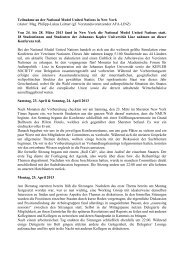Erfolgreiche ePaper selbst erstellen
Machen Sie aus Ihren PDF Publikationen ein blätterbares Flipbook mit unserer einzigartigen Google optimierten e-Paper Software.
6 International<br />
"Slacktivism" or NewTool forPolitical Change?<br />
Web-based activism platforms like Avaaz.org claim to herald anew era ofglobal citizen empowerment for political<br />
change. Critics object that theymight do moreharm than good. Whatare their arguments?<br />
Text<br />
Joachim Thaler<br />
In today’s "global village", the Internet has<br />
madeitpossibletodistributemoreinformation<br />
to alarger number of people inless time than<br />
ever before. This development has not spared<br />
social and political movements: web-basedactivism<br />
platforms have emerged which aim at turning<br />
large-scale public attention towards acause<br />
in order to transform it into pressure ondecision<br />
makers. The impact ofthese communities, however,iscontroversial:While<br />
proponentshail them<br />
as apowerful newtool of bringing about change,<br />
critics hold that they not only lack effectiveness,<br />
butmay even be harmfultocitizen engagement.<br />
Avaaz.org<br />
Today, the most prominent web-based activism<br />
platform is Avaaz.org. While anumber of similar<br />
platforms exist atnational level, Avaaz addresses<br />
issues and online activists worldwide. Founded in<br />
2007, it has set itself the confident goal of "closing<br />
the gap between the world we have and the<br />
world most people everywhere want." Following<br />
this broad mission, Avaaz –unlikemostother social<br />
movements and NGOs –does not focus on<br />
asingle issue, but campaigns on many different<br />
matters of public concern, ranging from climate<br />
change and conflict to corruption and poverty.<br />
The organisation’s campaigns are orchestrated<br />
by acore team of some 50full-time activists. But<br />
it is the roughly 13 million registered "members"<br />
from 193 countries thatmakeAvaaz amovement<br />
of unprecedentedsize.<br />
However, the threshold to membership islow:<br />
All it takes tojoin Avaaz is signing apetition on<br />
its website. From then on, members regularly<br />
receive campaign e-mails, each of which is dedicated<br />
to aspecific cause and calls on members to<br />
sign apetition directed at the responsible decision<br />
makers –beitpolitical leaders orcorporate<br />
executives. With afew clicks, the petition link<br />
can beshared via Facebook and Twitter in order<br />
to mobilise further signatories –and thus, future<br />
Avaaz members.<br />
This shows that, like inthe case of other webbased<br />
activism communities, the e-petition<br />
stands at the heart of every Avaaz campaign. Its<br />
purpose is to channel global public attention to<br />
acause in the critical moment when adecision<br />
needs to be made. The movement isfounded on<br />
the beliefthatinsuch a"momentofcrisis and opportunity",<br />
public pressure can tip the scales in<br />
favour of the community’s demands.<br />
An exampleofonlineactivism, pejoratively labelled as "slacktivism", with this billboardcalling<br />
foractiononline.<br />
Photo:Flickr /{Guerrilla Futures |JasonTester}<br />
Onlineactivism –ineffectiveand demobilising...<br />
This belief, however, is controversial. Comparing<br />
it with traditional forms of activism such as<br />
demonstrations or civil disobedience, critics hold<br />
that this kind of "clicktivism" istoo weak to significantly<br />
influence political or corporate decision<br />
making. But several ofthem gofurther than just<br />
denying the effectiveness of e-petitions. They argue<br />
thatsuch online campaigns cause citizen disengagement<br />
and are therefore actually counterproductivetotheir<br />
very goals in the longterm.<br />
This theory is based onthe first assumption according<br />
to which online activism isless effective<br />
than its non-virtual counterpart. Itargues that<br />
potential or practising "offline activists" may be<br />
lured away from "real-world" engagement by<br />
Internet activism because the latter requires a<br />
lowerlevel of time, commitmentand risk.<br />
Consequently, they remain trapped in what has<br />
pejoratively been labelled as "slacktivism". Consisting<br />
of the words "slack" and "activism", this<br />
term stands for "feel-good online activism" without<br />
any real impact,which servesa"lazy generation"<br />
that wants to avoid the inconveniences of<br />
real-life engagement. Wrongly assuming that by<br />
signing an e-petition they contribute toeffective<br />
"action"for agood cause, "slacktivists" have little<br />
or no incentive to engage inmore challenging<br />
forms of activism withreal impact,critics argue.<br />
Alternatively, when online activists realise the<br />
ineffectiveness of their actions, opponents fear<br />
that the resulting frustration might even cause<br />
them to lose their faith in any kind of activism<br />
altogether –thus leading to their permanent demobilisation.<br />
...oracomplement to traditional activism?<br />
Proponents of online activism, on the other hand,<br />
reject the criticism that e-petitions cause citizen<br />
disengagement. They hold that online activism<br />
does not replace, but complements traditional<br />
forms of activism: people who have previously<br />
engaged in non-virtual, "high commitment" activism,<br />
they argue, are unlikely to settle for "low<br />
GLOBAL VIEW 3/2011



